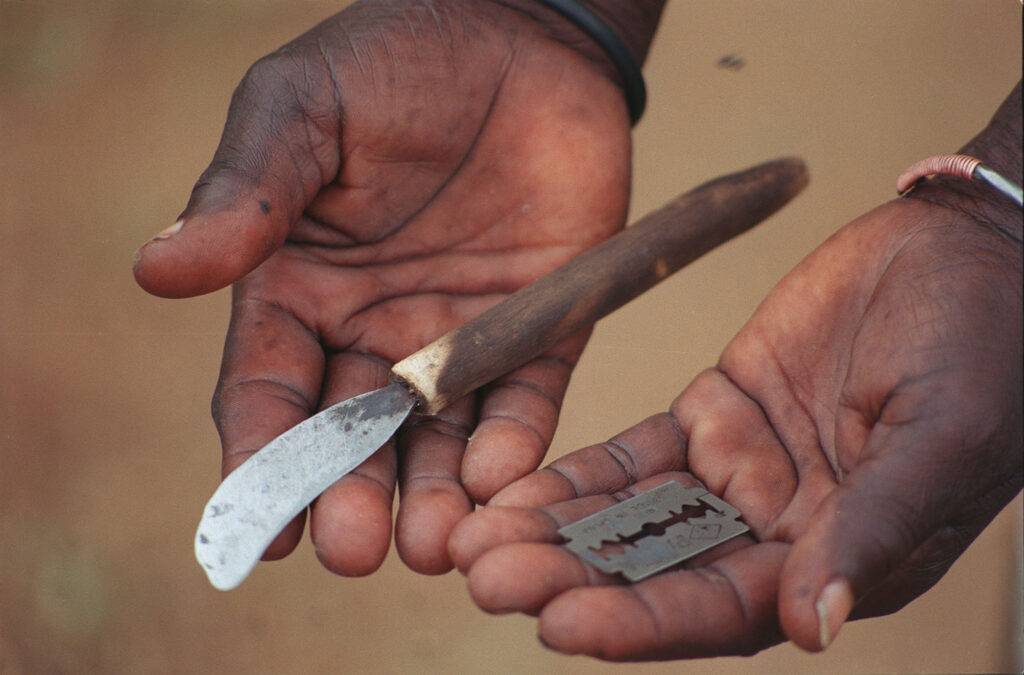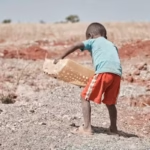Female Genital Mutilation is a barbaric practice that involves the removal of a girl’s external genitalia, often with crude instruments such as razor blades, rusty cans, or glass fragments. The sheer cruelty of this act is unfathomable, yet it persists in many societies, shrouded in tradition and misconceptions.

Rahina, a young girl gruesomely subjected to FGM at the tender age of nine, endured excruciating pain and lasting trauma. She still remembers the fear, pain, and helplessness she felt, and she is haunted by that memory. Rahina’s story is not unique; it mirrors the devastating impact FGM has on girls and women worldwide. While her resilience is inspiring, no child should have to endure such atrocities in the name of tradition.
The Roots of Female Genital Mutilation
Female Genital Mutilation is inflicted upon young girls in various communities for multiple reasons: controlling a woman’s sexuality, marking cultural rites of passage, and adhering to misguided notions of morality and purity. Some cultures even justify it on hygienic grounds, deeming female genitalia as unclean. In certain societies, FGM is a prerequisite for marriage. These justifications only mask the cruel and irreversible harm inflicted on helpless girls.
Nimco Ali, a fierce advocate against FGM, once said, “Forget culture, forget community, and think about the child.” Her words remind us of the urgency to confront this violation of human rights and uphold the dignity of girls and women everywhere.
The Devastating Consequences
FGM subjects its survivors to both immediate and long-term complications, including severe infections, hemorrhaging, and physical trauma. Many young girls succumb to these complications, with their lives cut tragically short. For those who survive, the psychological and emotional scars often manifest as depression, anxiety, and post-traumatic stress disorder.
Furthermore, FGM robs girls of their autonomy over their bodies. They are forced into this brutal act at a young age, frequently between infancy and puberty, with no say or understanding of what is being done to them. The absence of consent and choice is a profound violation of their rights
A Global Violation of Rights
Female Genital Mutilation is recognized globally as a violation of human rights. It not only endangers lives but also undermines efforts to achieve the Sustainable Development Goals (SDGs), including reducing child and maternal mortality and combating diseases such as HIV/AIDS. Medical research has shown that FGM significantly increases the risk of HIV transmission to girls and women.
According to a 2024 World Health Organization (WHO) report, over 230 million girls and women alive today have undergone FGM in 30 countries where the practice is prevalent. If current trends continue, an estimated 68 million more girls could be affected by 2030. Such staggering statistics serve as a call to action for the international community.

The Path to Ending Female Genital Mutilation
A multifaceted approach is required to combat FGM effectively, including legal reforms, community engagement, and educational programs. We must work tirelessly to enforce laws that unequivocally prohibit FGM, ensuring perpetrators are held accountable. As one advocate stated, “Behind every prosecution of an FGM perpetrator is a child that has been failed.”
At the grassroots level, we must engage with communities to challenge harmful norms and beliefs. Dialogue, education, and empowering women and girls with knowledge and resources are essential for dismantling the systems of oppression that perpetuate this practice.
Our Call to Action
We stand united in our commitment to abolish FGM permanently. Our societies depend on collective action and a steadfast commitment to justice. As Nimco Ali eloquently said, “If not us, who? And if not now, when?”
Join us in this critical mission to protect and empower every girl. Support organizations fighting FGM, educate your communities, and advocate for stronger legal protections. Together, we can ensure that girls everywhere are free from violence, discrimination, and exploitation.
Act now to uphold dignity and protect the rights of girls around the world.
Rahina, a young girl gruesomely subjected to FGM at the tender age of nine, endured excruciating pain and lasting trauma. She still remembers the fear, pain, and helplessness she felt, and finds herself haunted by that memory. She is an example of numerous accounts that highlight the devastating impact of FGM on girls and women worldwide. Many people continue to be deprived of their rights and dignity by this barbaric practice, which has its roots in tradition and misconceptions. However, Rahina’s story stands as a beacon of resilience and hope. Through her courage and determination, she did not only overcome the agonizing effects of FGM but became a firm advocate of social change.
Female Genital Mutilation is inflicted upon young girls in various communities for a multitude of reasons, including psychosexual reasons a means to control a woman’s sexuality, cultural rites of passage into womanhood, and religious doctrines of morality and purity. Tragically, some cultures even justify it on hygienic grounds, deeming the female genitalia as unclean and in need of modification. In other societies, FGM is a prerequisite for marriage. However, underneath these justifications is a sobering reality: the irreversible harm inflicted upon helpless girls.
Nimko Ali’s quote, “Forget culture, forget community, and think about the child,” highlights the dire need to end this horrific violation of human rights. By confronting the atrocity of FGM, we can work towards a more just and equitable society where all girls and women have the right to dignity and freedom from the heinous act of FGM.
Female Genital Mutilation is a severe and devastating issue that subjects its survivors to immediate and long-term complications, including severe infections, hemorrhage, and physical trauma. Many girls succumb to these complications with their lives cut short in the name of tradition. Those who survive often endure psychological and emotional scars, depression, anxiety, and post-traumatic stress disorder.
Additionally, FGM robs young girls of their choices and power over their bodies, as theyare deprived of the fundamental right to make informed decisions about their sexual health and well-being since the abuse is perpetrated at a young age, frequently between infancy and puberty. Rather, they are compelled to remain silent and endure the agonizing ordeal without a choice or consent.
As gender and development advocates, it is our responsibility to condemn FGM in all its forms,as every individual, regardless of gender, is entitled to certain inalienable rights, including the right to bodily integrity and freedom from harm. We violate these fundamental principles when we let FGM continue, perpetuating a cycle of violence and injustice against women and girls.
The practice of FGM is recognized internationally as a violation of the human rights of girls and women, and a threat to achieving the Sustainable Development Goals (SDGs) which include reducing child and maternal mortality and combating HIV / AIDS, malaria, and other diseases. The international community has pledged to put an end to female genital mutilation by 2030 through the SDGs integrated target to eliminate harmful practices. However, progress would have to occur at a rate 27 times faster than it has in the last ten years to meet this goal. According to the World Health Organization (WHO) 2024 report, more than 230 million girls and women alive today have undergone FGM in 30 countries where FGM is practiced, and if current trends continue, 68 million more could be affected by 2030. Moreover, statistics from international organizations such as WHO, UNICEF, UNFPA, and World Bank indicate that most countries where FGM is prevalent have high records of maternal mortality. Medical research also shows that the practice of FGM increases the risks of HIV/AIDS transmission to young girls and women.
A multifaceted approach is needed to combat FGM, including legal reforms, community engagement, and educational programs. We must work tirelessly to enact and enforce laws that unequivocally prohibit FGM, holding perpetrators accountable for their crimes. “Behind every prosecution of an FGM perpetrator is a child that has been failed.” Engaging with communities at the grassroots level, challenging harmful norms and beliefs through dialogue and education, and empowering women and girls with knowledge and resources, can undermine the entrenched systems of oppression that perpetuate FGM.
Let us stand united in our resolve to abolish FGM permanently. The future of our societies depends on our collective action and steadfast commitment to justice and equality. We are the progressive change we seek, and we must lead the change. As aptly put by Nimco Ali, “If not us, who? And if not now, when?” Together, let us champion the rights of women and girls, ensuring that they are free from violence, discrimination, and exploitation. Only then can we truly claim victory in the struggle for gender equality and human dignity.
Act now: Support organizations fighting against FGM, educate your communities, and advocate for stronger legal protections. Join us in this important mission to protect and empower every girl.
Read Also: End Period Poverty: Advocating for Free Menstrual Products in Ghanaian Schools



